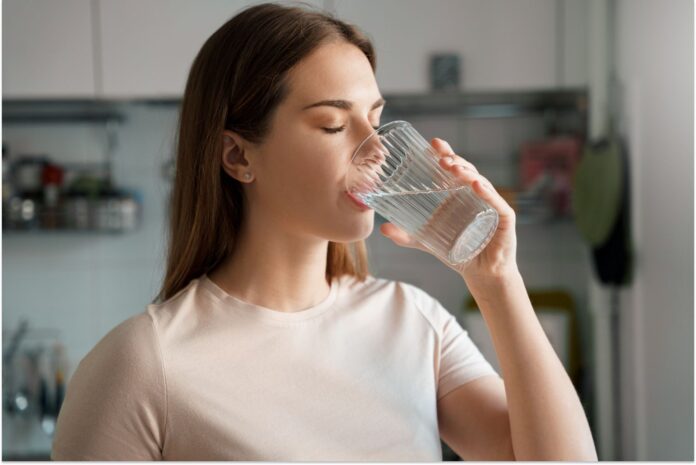Our cultural obsession with hydration (Americans drink more water than almost all other countries) has entered a new phase: adding salt to your morning glass of water. Influencers are touting salt water as the latest way to level-up your daily routine, claiming numerous benefits including boosting hydration, supporting digestion and helping to detox your body.
One TikTok influencer went as far as to say, “If you’re drinking plain water, then you’re probably not properly hydrating.”
Health professionals have long encouraged people to reduce their sodium intake to no more than 2,300 milligrams per day, warning that too much sodium (a mineral in table salt) can lead to high blood pressure, raising the risk of stroke and heart attack. Meanwhile on TikTok, some influencers are pouring as much as two teaspoons of salt into their water, which is the equivalent of 3,360 milligrams of sodium—over 1,000 milligrams more than the recommended daily limit in just one glass.
So which is it? Does adding salt to your water really boost your hydration—or could the additional sodium harm your health? Here’s what you need to know.
Should you add salt to your water?
Despite the social media testimonials, one expert says the salt water trend is all hype.
“There’s no benefit whatsoever,” says registered dietitian and professor of nutrition Lisa Young. Water is hydrating enough on its own, she says, and adding salt poses a health risk. In the short term, getting too much sodium can lead to puffiness, bloating, and weight gain, according to the American Heart Association. It can even disrupt your sleep. Excessive sodium can also be dangerous to some groups.
As for the claims that salt water helps “detox” your body, Young points out that your kidneys rid the body of toxins, and it does not need help with the process. Further, to the people who argue that salt water boosts digestion, Young says any improvement in digestions is likely from the water itself, not the salt.
The popular salt water trend is likely being fueled by another hydration obsession: electrolytes.
Electrolytes, like sodium, potassium, and magnesium, are minerals that your body needs to function. You can easily get them through food, Young says. Most foods like whole grain bread or condiments have sodium from added salt, while fruits and vegetables are plentiful resources of potassium and magnesium, she adds.
The only people who need to supplement with additional electrolytes are those who exercise vigorously, like people training for marathons or long-distance cycling events, or anyone who experiences hyponatremia—low sodium in the blood—from certain medications, Young says.
“It’s almost impossible not to get your sodium,” Young says. “Drinking plain water is totally fine.”
If you insist on adding salt to your water or are concerned about your electrolyte intake, Young says to add no more than one-eighth of a teaspoon of salt. And while she doesn’t think electrolytes are needed for those who aren’t doing intense workouts, she says having an electrolyte drink is better than straight salt water because the sodium levels aren’t as high, and it is balanced with the other key electrolytes—potassium and magnesium.
Sodium adds up
While sodium is necessary to control your body’s fluid balance, Young emphasizes that we get enough sodium from food, so drinking salt water could really put you over-the-top.
Here are some of the foods highest in sodium:
- Deli meats
- Cheese
- Potato and tortilla chips
- Salad dressings
- Bread
- Prepackaged sauces
- Frozen meals
- Canned soups and boxed broths
- Shrimp
- Meals like macaroni and cheese, pizza, burritos, and tacos
One influencer says that while the typical American diet is too high in sodium, if your diet is mostly whole foods, you’re probably not getting enough sodium. Young says that’s largely inaccurate.
“My diet is like 90% whole foods and I guarantee you I’m getting enough sodium,” Young says. “Salt and sugar are the two most common preservatives. We’re getting way more than we need.”
For more on hydration:
- The incredible health benefits of drinking enough water: New study highlights role in weight loss, migraines, and more
- It’s not 8 glasses a day anymore. Here’s how much water you should drink each day
- Are electrolyte powders good for you? What nutrition experts want you to know before taking any hydration supplement
- IV therapy is soaring in popularity, but it’s not without risks. Experts explain the pros and cons
This story was originally featured on Fortune.com

